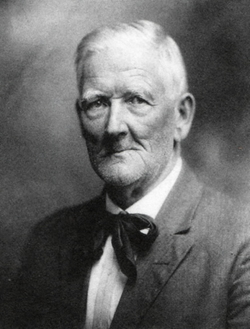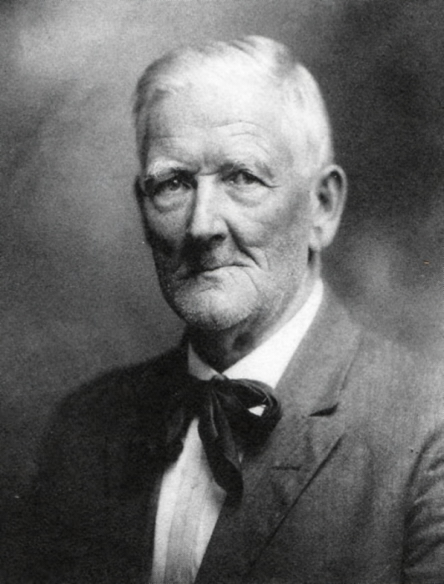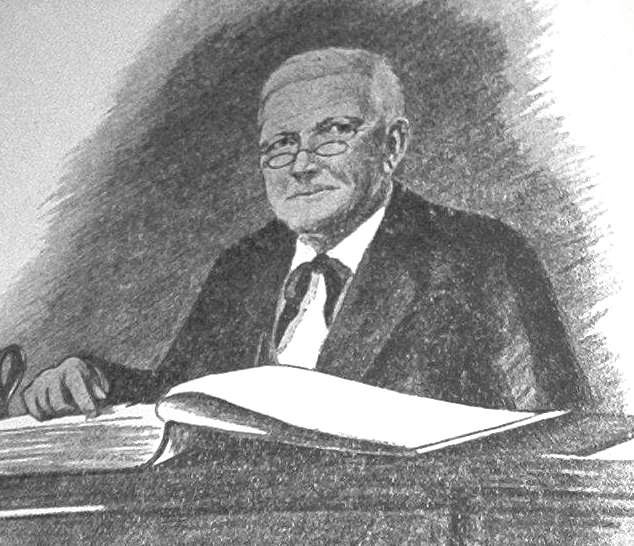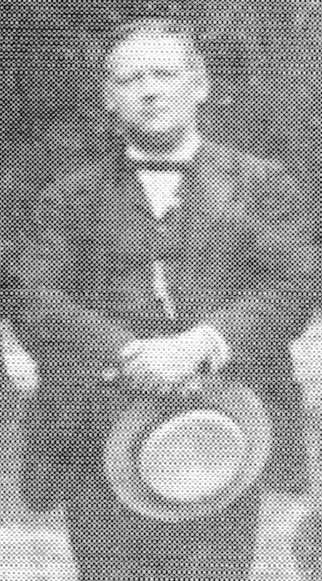"Justice John", as he was known throughout the country was formally elected to the bench in 1888 and served continuously for 32 years. From 1870 to 1888 he was frequently called upon to serve as senior magistrate. In addition to his other duties, he was Richmond's first juvenile court judge.
He enlisted in Company G of the Fourth Virginia Cavalry on August 16, 1861 at Richmond.
------------------------------------
The following are excerpts from the abundant information graciously provided me by Donald Traser, Past Master and current Secretary of Saint John's Lodge No. 36 in Richmond, Virginia. In Mr. Traser's words; " The main info I was concerned about you having was for his Masonic membership and complete list of survivors".
Thus that is covered immediately;
Elected September 11, 1866
Initiated September 11, 1866
Passed September 24, 1866
October 13, 1866
Worshipful Master 1870
He is survived by five children. His three daughters are Mrs. Aylett T. Goddin, Mrs. George Wright, and Mrs. Allie Woodfin. The two sons are George Knox and F. Lawton Crutchfield. Three sisters, who are Mrs. Charles W. Goddin and Mrs. Helen K. Randall, of Richmond, and Mrs. Thomas W. Sydnor of Seattle, Wash., survived. Another son, John J. Crutchfield, Jr., died several years ago.
The obituary, taken from the Richmond Times-Dispatch, provides several anecdotal instances of which include;
Justice John had a faculty for getting at the bottom of things right at the start, and he was perhaps the best judge of human nature that presided over this popular branch of the criminal court of the city. He was fair, and he has often been forced to discharge people whom he knew were guilty, but there was a lack of evidence to warrant a conviction.
Time and time without number he had had parties in court who had sworn out warrants, and before the trial could be called they would reach a basis of agreement. That was done to save the fines and costs that would be imposed on the offender, and the settlement was made to prevent the payment. The justice would call them.
“I desires to wifdrew dis warrant, Mr. Justice, Your Honor,” the accuser would say.
“Here it goes. I’m beaten again. All right. When you wifdrew dis warrant just wifdrew $2.50 for the warrant and the costs and then all of you proceed to wifdrew from this courtroom and stay away.”
Much that appeared in the court proceedings was the badinage between the justice and the lawyers. They would undertake to expound the law to him and to induce him to listen to their please and see to confuse the justice. This is not known to have ever succeeded, and the repartee was often sparking and bright. Justice John was the real friend of the colored people, one of his staunchest supporters being Giles B. Jackson, the colored lawyer. Justice John had much respect for the colored barrister, and he could appeal to Justice John with more effect than all the colored lawyers combined.
It happened once or twice that lawyers of severe dignity could not understand Justice John, or the feared to encounter his sharp satire and they have been profound and deep in their presentation of matters for his consideration. When these would appear in court the justice would make things as dull, stiff and dignified as the most ardent expounder of gloom could wish. He was a friend of everybody, save and except the professional crook, the inherently mean, the vicious and the depraved. There will never be another Justice John.
"Justice John", as he was known throughout the country was formally elected to the bench in 1888 and served continuously for 32 years. From 1870 to 1888 he was frequently called upon to serve as senior magistrate. In addition to his other duties, he was Richmond's first juvenile court judge.
He enlisted in Company G of the Fourth Virginia Cavalry on August 16, 1861 at Richmond.
------------------------------------
The following are excerpts from the abundant information graciously provided me by Donald Traser, Past Master and current Secretary of Saint John's Lodge No. 36 in Richmond, Virginia. In Mr. Traser's words; " The main info I was concerned about you having was for his Masonic membership and complete list of survivors".
Thus that is covered immediately;
Elected September 11, 1866
Initiated September 11, 1866
Passed September 24, 1866
October 13, 1866
Worshipful Master 1870
He is survived by five children. His three daughters are Mrs. Aylett T. Goddin, Mrs. George Wright, and Mrs. Allie Woodfin. The two sons are George Knox and F. Lawton Crutchfield. Three sisters, who are Mrs. Charles W. Goddin and Mrs. Helen K. Randall, of Richmond, and Mrs. Thomas W. Sydnor of Seattle, Wash., survived. Another son, John J. Crutchfield, Jr., died several years ago.
The obituary, taken from the Richmond Times-Dispatch, provides several anecdotal instances of which include;
Justice John had a faculty for getting at the bottom of things right at the start, and he was perhaps the best judge of human nature that presided over this popular branch of the criminal court of the city. He was fair, and he has often been forced to discharge people whom he knew were guilty, but there was a lack of evidence to warrant a conviction.
Time and time without number he had had parties in court who had sworn out warrants, and before the trial could be called they would reach a basis of agreement. That was done to save the fines and costs that would be imposed on the offender, and the settlement was made to prevent the payment. The justice would call them.
“I desires to wifdrew dis warrant, Mr. Justice, Your Honor,” the accuser would say.
“Here it goes. I’m beaten again. All right. When you wifdrew dis warrant just wifdrew $2.50 for the warrant and the costs and then all of you proceed to wifdrew from this courtroom and stay away.”
Much that appeared in the court proceedings was the badinage between the justice and the lawyers. They would undertake to expound the law to him and to induce him to listen to their please and see to confuse the justice. This is not known to have ever succeeded, and the repartee was often sparking and bright. Justice John was the real friend of the colored people, one of his staunchest supporters being Giles B. Jackson, the colored lawyer. Justice John had much respect for the colored barrister, and he could appeal to Justice John with more effect than all the colored lawyers combined.
It happened once or twice that lawyers of severe dignity could not understand Justice John, or the feared to encounter his sharp satire and they have been profound and deep in their presentation of matters for his consideration. When these would appear in court the justice would make things as dull, stiff and dignified as the most ardent expounder of gloom could wish. He was a friend of everybody, save and except the professional crook, the inherently mean, the vicious and the depraved. There will never be another Justice John.
Family Members
-
![]()
Mary Jane Crutchfield Allen
1828–1862
-
![]()
Sarah W. Crutchfield Tinsley
1830–1905
-
![]()
Cornelia H Crutchfield
1833–1916
-
![]()
George R. Crutchfield
1835–1835
-
![]()
Martha T. Crutchfield Jones
1836–1861
-
![]()
Maria Josephine Crutchfield Sydnor
1838–1928
-
![]()
George Knox Crutchfield
1840–1918
-
![]()
Leigh Crutchfield
1852–1892
-
![]()
Dr William Trueheart Crutchfield
1853–1889
-
![]()
Susan Trueheart "Sue" Crutchfield Goddin
1855–1930
Sponsored by Ancestry
Advertisement
Explore more
Sponsored by Ancestry
Advertisement



























